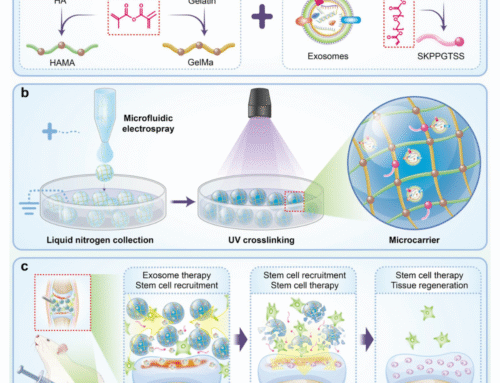Published in the Journal of Extracellular Vesicles, May 2024
Lead author: Dr. Gagandeep Kaur
A study published in the Journal of Extracellular Vesicles reports that extracellular vesicles (EVs) derived from mesenchymal stem/stromal cells (MSCs) using microcarrier-based cultures are more effective in suppressing immune responses than those from conventional monolayer cultures. The researchers also found that TGF-β1 levels in EVs can serve as a surrogate biomarker to predict their therapeutic potency, providing a simple and scalable approach to quality control for EV-based therapies.

What Are Extracellular Vesicles and Why Are They Important?
Extracellular vesicles are nanoscale, membrane-enclosed particles released by cells. They transport proteins, RNAs, and other biomolecules that reflect the identity and activity of their parent cells. In regenerative medicine and immunotherapy, EVs—especially those derived from MSCs—are being investigated for their ability to modulate immune responses, reduce inflammation, and promote tissue repair.
Compared to live cell therapies, MSC-EVs offer advantages in safety, scalability, and regulatory handling. They do not replicate, carry lower risk of tumorigenicity, and can be more readily standardized. However, variability in EV content and a lack of validated potency assays remain major barriers to clinical translation.
Autoimmune Uveitis: A Disease Model for Immune-Mediated Inflammation
Autoimmune uveitis is an inflammatory eye disease driven by T cells that attack retinal antigens. It can cause vision loss and is often chronic or relapsing. Treatments typically rely on corticosteroids or systemic immunosuppressants, which are not suitable for long-term use in many patients.
Experimental autoimmune uveitis (EAU) in mice serves as a preclinical model to study the underlying mechanisms of this disease and test potential therapies. Because MSC-EVs can suppress T cell responses, they are being explored as a therapeutic option in this context.

Microcarrier Culture Enhances EV Functionality
In this study, the research team compared MSC-EVs produced from two different culture systems:
- Traditional 2D monolayer cultures (ML-EVs)
- 3D microcarrier-based cultures (MC-EVs)
The results showed that MC-EVs contained higher levels of immunoregulatory molecules, particularly TGF-β1 and microRNA let-7b, and were more effective at reducing inflammation in EAU models. Specifically, MC-EVs:
- Suppressed IFN-γ secretion in activated splenocytes
- Reduced infiltration of autoreactive CD3+ T cells into the retina
- Prevented progression of retinal tissue damage in vivo
TGF-β1 as a Surrogate Potency Marker
A key outcome of the study was the identification of TGF-β1 levels in EVs as a reliable surrogate biomarker for immunomodulatory potency. The researchers observed a strong correlation between the amount of TGF-β1 in EV preparations and their ability to suppress IFN-γ in T-cell cultures.
Using logistic regression and ROC analysis, the study demonstrated that TGF-β1 levels can predict EV efficacy, offering a practical, ELISA-based alternative to in vivo potency testing. This surrogate assay addresses a major hurdle in EV therapy development: the ability to assess therapeutic potential in a standardized, scalable way.

Broader Implications
The findings support the use of microcarrier culture systems for producing more potent and consistent MSC-EVs. They also contribute to the growing effort to establish validated assays for EV product characterization, which is critical for meeting regulatory standards in clinical trials and commercial manufacturing.
The combination of optimized culture conditions and a quantitative surrogate marker represents a step forward in enabling the reliable development of EV-based therapies for immune-mediated conditions such as uveitis, and potentially for other inflammatory or autoimmune diseases.
Related: The study underscores the importance of optimized microcarrier-based culture systems for producing potent MSC-EVs. At Smart MCS, we offer microcarriers designed to support efficient MSC expansion and EV manufacturing workflows. To learn more, visit our product page or contact us at info@smartmcs.com.au.






Leave A Comment